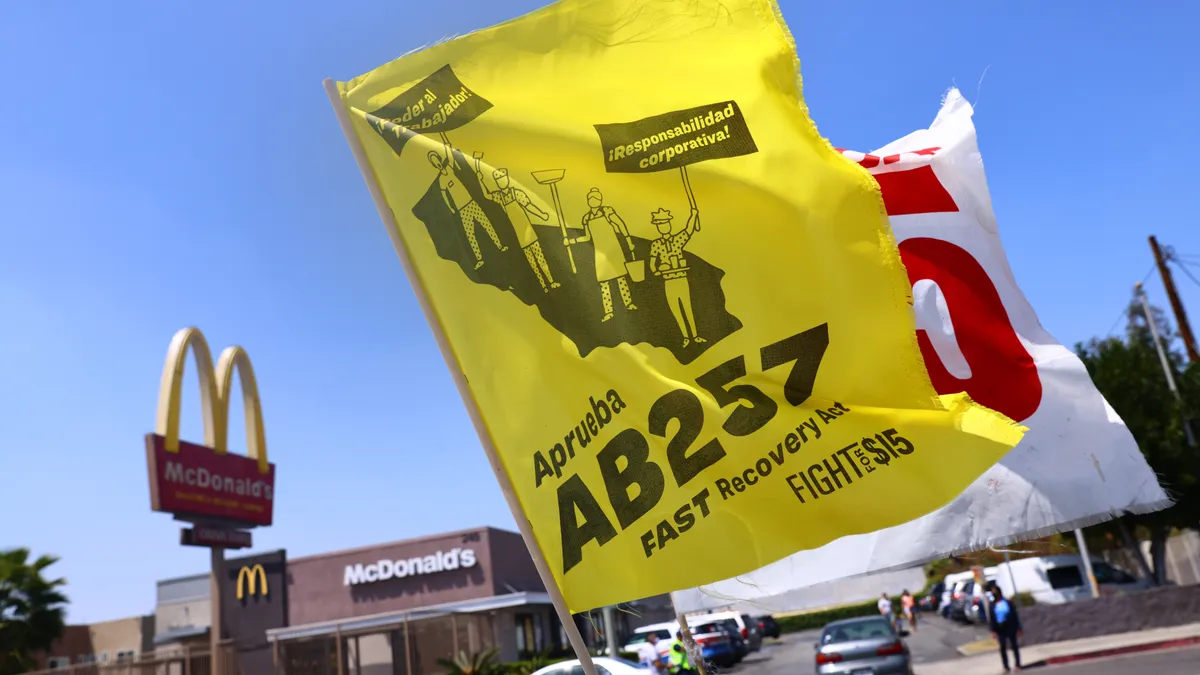Dive Brief:
- California Secretary of State Shirley Weber announced that the referendum initiative challenging California’s fast food council law reached the required number of verified signatures Tuesday, in a political win for the fast food industry.
- The announcement delays the implementation of the law until after California’s next statewide election, which is scheduled for November 2024, unless other process trigger a special election in the intervening time.
- A California judge previously blocked attempts to enforce the law while the secretary of state verified petition signatures.
Dive Insight:
Since the approval of AB 257 (The FAST Recovery Act) last summer, the fast food sector has rallied to overturn the landmark labor law. The industry has already given more than $13,7000,000 to defeat AB 257, which would create a council to regulate wages and working conditions for fast food workers, at the ballot box, California records show. With almost two years to go before election day, the referendum on AB 257 is shaping up to be a major political duel between organized labor and the restaurant industry, with potentially national ramifications.
Weber’s office verified about 700,000 of the more than 1,000,000 signatures submitted by the restaurant industry coalition to stop the law, exceeding the needed total by just shy of 90,000.
The secretary of state’s announcement drew celebration from industry groups.
“Had this ruinous policy gone into effect, not only would food prices rise and jobs be lost, but big labor would already be exporting it to other states and industries,” Glenn Spencer, SVP of employment policy at the U.S. Chamber of Commerce, said in a Save Local Restaurants press release emailed to Restaurant Dive.
Sean Kennedy, EVP for public affairs at the National Restaurant Association, said the law would have threatened to increase costs throughout the industry, and pledged continued support to efforts to overturn it.
Supporters of AB 257, on the other hand, expressed a commitment to fighting it out in the referendum process.
“We are undeterred, and we refuse to back down,” Angelica Hernandez, a California McDonald’s worker, said in a statement emailed to Restaurant Dive. “Nothing will stop Black, brown and immigrant fast-food workers across the state from having a seat at the table and gaining power over our working conditions.”
Mary Kay Henry, president of the Service Employees International Union, predicted the referendum would have a different outcome than Proposition 22, the state’s previous electoral battle between labor groups and a major industry. A California judge ruled that proposition was unenforceable.
“Fast-food corporations think they can buy their way out of anything, but California voters are about to teach them an expensive lesson: no corporation is more powerful than half a million workers joining together,” Henry said in a press release.
Some politically active unions, frustrated with the National Labor Relations Board’s election process and facing declining private sector density, are turning toward labor law reform as a path to revising the power relations between organized labor and employers. That strategy may make it possible for unions to organize workers in industries historically immune to organizing under NLRB process — such as the restaurant sector — but it risks expensive political confrontations between labor and industry.














